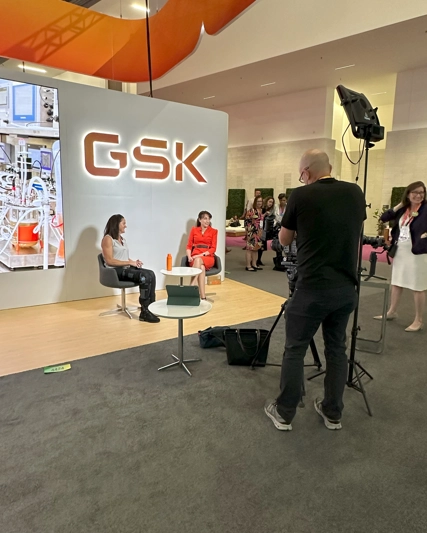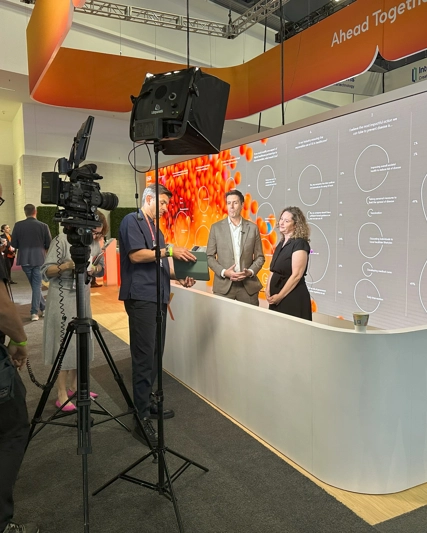GSK unveils Target the Future, a global, multi-year program to help address key challenges affecting the multiple myeloma community
For media and Investors only
$100,000 grant to be awarded to best idea submitted to Target the Future Think Tank Challenge
GlaxoSmithKline (GSK) plc today launched Target the Future, an international, multi-year initiative dedicated to advancing innovation and addressing key needs in the multiple myeloma community. The program will provide education on progress in the field of multiple myeloma, identify key challenges the community faces, and facilitate solutions to help create a better future for patients, their caregivers and loved ones.
Target the Future was inspired by the recent advances in the field of multiple myeloma combined with the remaining challenges that patients face. Multiple myeloma is the third most common blood cancer worldwide[i] and second most common blood cancer in the US;[ii] it is generally considered treatable, but not curable.[iii] Despite recent treatment advances and the availability of newer and combination therapies, outcomes remain poor for patients with relapsed/refractory multiple myeloma.[iv]
“We’ve seen significant innovation in the development of new therapies for multiple myeloma during the past two decades, yet patients still face significant challenges, including access to care, emotional distress and disparities in outcomes among certain populations,” said Tania Small, Vice President, Global Medical Oncology Franchise Head, GSK. “As part of our ongoing commitment to the myeloma community, we connected with patients and caregivers to identify some of the community’s key challenges, and now, we’re calling on innovative minds around the world to contribute potential solutions to help address these issues. Together, we can accelerate ideas that will make a positive and meaningful impact for patients with multiple myeloma.”
Target the Future Think Tank Challenge
Target the Future aims to foster understanding of unmet needs in the multiple myeloma community and assist in developing solutions for these challenges. Beginning today, the program’s Target the Future Think Tank Challenge will accept submissions of ideas to create a better future for the multiple myeloma community. A grant of approximately $100,000 will be awarded to the strongest proposal that will bring the idea to life. Between now and 11 February 2022, patients, caregivers, healthcare professionals, researchers, data scientists, advocates or non-profit organizations can submit their proposals at www.targetthefuturemm.com. GSK will share the winning idea with the community and continue the program in the years ahead to provide additional education and solutions for the myeloma community.
Persistent Challenges in the Multiple Myeloma Community
GSK consulted with patients and caregivers to identify key issues impacting the myeloma community that entrants could address with their proposals, including:
- Understanding treatment options: While more treatments are available, understanding the appropriate options at each step of the journey can be difficult.
- Getting the right care: Finding or traveling to the right healthcare provider can be hard for patients with limited transportation or location options.
- Relieving the emotional burden: Managing stress associated with diagnosis, treatment, relapse, or the overall disruption to one’s life can be taxing for both patients and their caregivers.
- Addressing disparities and inequities: New ideas can help ensure equal access to care and resources.
Entries for the Think Tank Challenge will be judged based on criteria such as potential to impact the issue(s), novelty of the idea, feasibility to execute and alignment with unmet needs. The submissions will be evaluated by a multidisciplinary advisory group comprised of people personally and professionally connected to the multiple myeloma community.
To learn more about Target the Future or apply to the Think Tank Challenge, please visit https://targetthefuturemm.com.
GSK in Oncology
GSK is focused on maximizing patient survival through transformational medicines. GSK’s pipeline is focused on immuno-oncology, cell therapy, tumor cell targeting therapies and synthetic lethality. Our goal is to achieve a sustainable flow of new treatments based on a diversified portfolio of investigational medicines utilizing modalities such as small molecules, antibodies, antibody-drug conjugates and cell therapy, either alone or in combination.
About GSK
GSK is a science-led global healthcare company. For further information please visit www.gsk.com/about-us.
GSK inquiries: |
|
|
|
|
Media inquiries: |
Tim Foley |
+44 (0) 20 8047 5502 |
(London) |
|
|
Madeleine Breckon |
+44 (0) 20 8047 5502 |
(London) |
|
|
Kristen Neese |
+1 804 217 8147 |
(Philadelphia) |
|
|
Kathleen Quinn |
+1 202 603 5003 |
(Washington DC) |
|
Analyst/Investor inquiries: |
Nick Stone |
+44 (0) 7717 618834 |
(London) |
|
|
James Dodwell |
+44 (0) 20 8047 2406 |
(London) |
|
|
Sonya Ghobrial |
+44 (0) 7392 784784 |
(Consumer) |
|
|
Mick Readey |
+44 (0) 7990 339653 |
(London) |
|
|
Jeff McLaughlin |
+1 215 751 7002 |
(Philadelphia) |
|
|
Frannie DeFranco |
+1 215 751 4855 |
(Philadelphia) |
Cautionary statement regarding forward-looking statements
GSK cautions investors that any forward-looking statements or projections made by GSK, including those made in this announcement, are subject to risks and uncertainties that may cause actual results to differ materially from those projected. Such factors include, but are not limited to, those described in the Company's Annual Report on Form 20-F for 2020, GSK’s Q3 Results and any impacts of the COVID-19 pandemic.
[i] Bray F, Ferlay J, Soerjomataram I, Siegel RL, Torre LA, Jemal A. Global Cancer Statistics: Estimated number of incident cases worldwide, both sexes, all ages. CA Cancer J Clin, in press. The online GLOBOCAN 2020 database is accessible at http://gco.iarc.fr/, as part of IARC’s Global Cancer Observatory.
[ii] CA: A Cancer Journal for Clinicians, Vol. 70, Issue 1, Han/Feb 2020 Pages 7-30.
[iii] Kazandjian D. Multiple myeloma epidemiology and survival: A unique malignancy. Semin Oncol. 2016;43(6):676–681. doi:10.1053/j.seminoncol.2016.11.004.
[iv] Nooka AK, Kastritis E, Dimopoulos MA. Treatment options for relapsed and refractory multiple myeloma. Blood. 2015;125(20)


